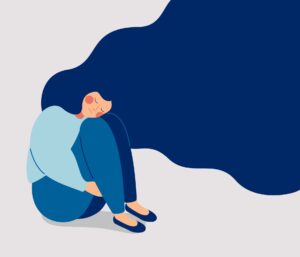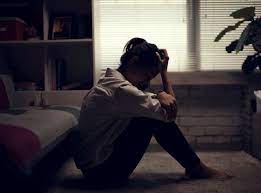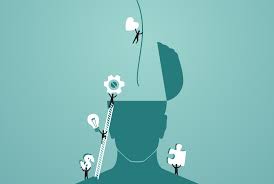Manic depression, also known as bipolar disorder, is a mental illness that causes people to experience extreme mood swings. These mood swings can cause people to feel extremely happy and energetic one minute, and then very sad and hopeless the next. Manic depression can be a very debilitating condition if left untreated. In this blog post, we will discuss the symptoms of manic depression, how it is diagnosed, and treatment options available for those who suffer from it.
Contents
What Is Manic Depression?
 Manic depression is a psychiatric disorder that is also known as bipolar disorder. This condition is characterized by extreme mood swings, which can include periods of extremely high energy and happiness (known as mania) followed by periods of low energy and depression.
Manic depression is a psychiatric disorder that is also known as bipolar disorder. This condition is characterized by extreme mood swings, which can include periods of extremely high energy and happiness (known as mania) followed by periods of low energy and depression.
This condition is simply described as having both a mental illness and a mood disorder. And while it can be difficult to manage, it is important to remember that there are treatments available that can help. Moreover, studies have found that people who have manic depression are more likely to be creative, which means that there is a bright side to this condition.
However, there is a downside to manic depression as well. This condition can lead to several complications and consequences. If you think you or someone you know might be dealing with manic depression, it is important to seek professional help or at least manage the symptoms as best as possible.
How Does A Person With Manic Depression Act?
When you think of someone who is depressed, you might picture someone sad and withdrawn. But a person with manic depression, or bipolar disorder, can have mood swings that are just as extreme in the other direction.
A person with manic depression may be extremely happy and full of energy one day and then plunged into a deep depression the next. For instance, let’s say that a person with bipolar disorder is having a manic episode. They may feel like they can accomplish anything and be very productive.
They may also feel like they need less sleep and have more energy than usual. Their mood may be so high that it’s hard for them to concentrate or sit still. On the other hand, during a depressive episode, a person with bipolar disorder may feel hopeless and helpless.
They may be unable to get out of bed or take care of basic needs. Their appetite may change and they may either lose or gain weight. They may also have trouble concentrating and making decisions. So, this is how a person with manic depression may act during different episodes.
If you think that you or someone you know may be suffering from bipolar disorder, it’s important to seek professional help. A mental health professional can diagnose and treat bipolar disorder. With treatment, people with bipolar disorder can lead healthy and productive lives.
What Are The Common Symptoms?
 There are a few common symptoms that are associated with manic depression. These include:
There are a few common symptoms that are associated with manic depression. These include:
- feeling extremely happy or “up” for long periods
- having a decreased need for sleep
- talking very quickly
- feeling restless or easily bored
- engaging in risky behaviors
During the “low” or depressed phase, people with manic depression may experience:
- feeling hopeless or helpless
- having low energy or fatigue
- losing interest in previously enjoyed activities
- experiencing changes in appetite
- sleeping too much or not being able to sleep
- feeling worthless or excessively guilty
- having difficulty thinking clearly or concentrating
According to studies, manic depression is more common in women than men. However, it is not yet clear why this is the case. It is also important to note that manic depression can occur at any age, but it typically begins in adolescence or young adulthood.
The signs and symptoms can be different for each person and can vary in severity. If you think you or someone you know may be experiencing manic depression, it’s important to seek professional help. A mental health professional can make a diagnosis and develop a treatment.
What Causes Manic Depression?
The causes of manic depression are not fully understood. However, it is thought to be caused by a combination of genetic and environmental factors.
Manic depression tends to run in families, so it is thought that there may be a genetic component to the disorder. Studies have shown that people with first-degree relatives (parents, siblings, or children) who have manic depression are more likely to develop the disorder than people without affected family members.
Environmental factors may also play a role in the development of manic depression. stressful life events, such as:
- death of a loved one,
- divorce, or
- financial problems,
These are some common triggers for an episode of mania or depression. While the exact causes of manic depression are not fully understood, a combination of genetic and environmental factors is thought to play a role. If you or someone you know has manic depression, there are treatments available that can help manage the symptoms and improve your quality of life.
How It Is Different From Bipolar Depression?
 It is important to understand the difference between bipolar depression and manic depression.
It is important to understand the difference between bipolar depression and manic depression.
Manic depression, also known as clinical depression, is a mental illness that is characterized by periods of extreme sadness, irritability, and fatigue. Bipolar disorder is a mental illness that is characterized by periods of extreme mood swings, from manic to depressive.
While both disorders can be debilitating, and even manic depression is a part of bipolar disorder, they are two distinct illnesses. Manic depression generally includes more depressive symptoms than bipolar disorder, while bipolar disorder includes more manic symptoms.
Manic depression is also more likely to include psychotic features, such as hallucinations and delusions, whereas bipolar disorder is less likely to include these features. Treatment for both disorders typically includes medication and therapy. But to many extents, both manic depression and bipolar disorder are unique illnesses that require unique treatments.
If you or someone you know is struggling with either disorder, it is important to seek professional help. There are many resources available to those who need them, and treatment can make a huge difference in the quality of life. Remember, you are not alone.
What Are The Consequences?
The consequences of manic depression can be very serious. Some common negative impacts include:
Loss of employment
It is not uncommon for people with manic depression to lose their job. This is often because they are not able to function properly when they are feeling depressed. For example, they may call in sick more often, or be less productive when they are at work.
Strained relationships
This one is a biggie. If you have manic depression, your relationships are likely to suffer. The symptoms of the disorder can make it hard for you to relate to others, and the episodes of mania or depression can make it hard for you to keep up with the demands of work, family, and social obligations.
Financial problems
It might seem like having money troubles is just a normal part of life, but for people with manic depression, it can be a real source of stress and anxiety. Money problems can lead to all sorts of other problems, like relationship troubles, job loss, and even homelessness. Financial problems are actually quite common in people with manic depression, so it’s important to be aware of them and seek help if necessary.
Substance abuse
Sometimes people with manic depression turn to drugs or alcohol to self-medicate. This can obviously lead to all sorts of other problems, like addiction and financial ruin. It’s important to be aware of this possibility and seek help if necessary. Do not take help from substance abuse to cope with manic depression.
Poor quality life
 When you are dealing with manic depression, it can feel like you are stuck in a never-ending cycle of ups and downs. You may experience periods of intense energy and happiness, followed by periods of deep depression and despair. This can make it difficult to maintain the overall quality of life and you will more likely to experience problems at work, school, and in your personal relationships.
When you are dealing with manic depression, it can feel like you are stuck in a never-ending cycle of ups and downs. You may experience periods of intense energy and happiness, followed by periods of deep depression and despair. This can make it difficult to maintain the overall quality of life and you will more likely to experience problems at work, school, and in your personal relationships.
Manic depression can also lead to suicide. In fact, it’s estimated that 15% of people with the disorder will eventually take their own lives. If you or someone you know is struggling with manic depression, it’s important to get help as soon as possible. There are many effective treatments available that can help people manage their symptoms.
How To Diagnose It?
The diagnosis of manic depression is made by a mental health professional based on the individual’s symptoms, course of illness, family history, and response to treatment.
There is no laboratory test, such as a blood test, to diagnose manic depression. However, blood tests may be done to rule out other disorders that can cause similar symptoms.
In order to be diagnosed with manic depression, an individual must have experienced at least one episode of mania or hypomania. These episodes must last for at least a week (or any duration if hospitalization is necessary).
During a manic or hypomanic episode, an individual must have at least three of the following symptoms:
- Inflated self-esteem or grandiosity
- More talkative than usual or pressured to keep talking
- Racing thoughts
- Distractibility
- Increase in goal-directed activity or energy
- Excessive involvement in risky behaviors
So the method of diagnosis is by speaking with a mental health professional and giving them a detailed account of your symptoms and behaviors. With an accurate diagnosis, you and your doctor can develop a treatment plan that is best for you.
How To Treat It?
 The treatment for manic depression is not the same for everyone. Some people may only need medication to control their symptoms, while others may need a combination of medication and therapy. And either way, self-care is important. You should work with your doctor to come up with a treatment plan that is right for you. Some options might include:
The treatment for manic depression is not the same for everyone. Some people may only need medication to control their symptoms, while others may need a combination of medication and therapy. And either way, self-care is important. You should work with your doctor to come up with a treatment plan that is right for you. Some options might include:
Medication
Antidepressants are the most common type of medication used to treat manic depression. These can help to stabilize your mood and regulate your sleep patterns. The medications are usually taken daily, and it may take several weeks for them to start working. Some other medications for might include:
Before considering any medication it is important to speak with your doctor about the potential risks and benefits. Some medications can have side effects, so it is important to be monitored closely by a medical professional while taking them.
Therapy
Psychotherapy, or talk therapy, can help you understand your illness and how to manage your symptoms. It can also provide support and guidance during difficult times. You may see a therapist every week, or less often depending on your needs. The main goal of therapy is to help you live a healthier, happier life.
There are many different types of therapy available. You should choose the right one as per your condition. Some common therapies used to treat manic depression include:
- Cognitive behavioral therapy (CBT)
- Interpersonal therapy (IPT)
- Family-focused therapy
- Dialectical behavioral therapy (DBT)
- Acceptance and commitment therapy (ACT)
Support groups
It is often believed that people with manic depression are better off not being in contact with other people who have the disorder. While it is true that support groups are not for everyone, they can be beneficial for many people. Support groups provide a space for people to share their experiences and feelings without judgment. They can also offer practical advice and support.
If you are considering joining a support group, it is important to find one that is right for you. There are many different types of groups, so it is important to do some research to find one that will meet your needs. You may also want to talk to your doctor or therapist about whether a support group would be right for you.
Self-help
 Although this cannot be the replacement for professional care, it is still important to do everything possible to manage the symptoms. A therapist can help develop a plan and offer support, but it is important to be proactive about self-care. This includes:
Although this cannot be the replacement for professional care, it is still important to do everything possible to manage the symptoms. A therapist can help develop a plan and offer support, but it is important to be proactive about self-care. This includes:
- maintaining a healthy lifestyle
- getting regular exercise
- eating a balanced diet
- getting enough sleep
- avoiding drugs and alcohol
- challenging your beliefs about yourself
- practicing stress reduction techniques
- connecting with others who understand
- staying hopeful and positive
These are all important things to keep in mind when struggling with this condition. It is important to remember that you are not alone and that there is hope. With the right treatment plan, symptoms can be managed and you can live a happy and fulfilling life.
Therefore, one must not give up and must continue to fight despite the challenges. manic depression can be daunting, but there are many resources available to help you through it. Seek professional help, do your research, and most importantly, never give up hope.
Conclusion
In conclusion, it can be said that manic depression is a serious mental illness that can have profound effects on an individual’s life. While it is possible to live a relatively normal life with the condition, it is important to seek professional help if you think you may be suffering from this condition.
Because it can manifest in different ways, it can be difficult to diagnose. However, there are treatments available that can help manage the symptoms and improve the quality of life for those suffering from manic depression.
For more information and tips you can contact Therapy Mantra. We have a team of professional therapists who can provide you with the support and guidance you need to recover from this condition. Contact us today to learn more about our services. You can also book an online therapy session or download our free Android or iOS app.


